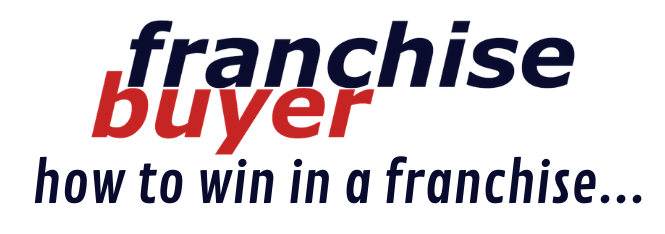March 22, 2019
“I thought I could do it much better, so I started my own franchise finance company.”
The Cashflow It© Group is focused on providing finance solutions to the franchise sector with particular emphasis on equipment, which is often the primary cost to a new franchisee.

Spotting an opportunity in the market, managing director James Scurr founded the company in February 2014. Having already worked with a publically listed company — where he had developed a successful division focused on providing finance for franchisees - he was convinced there was still a fair way to go to better meet customer needs.
I was asked to join a finance company to set up a division that would service the franchise sector,'' says James. I did that for a few years, got it all set up and it was all going quite well. Then when I left the company, I was potentially looking at buying a couple of franchises, getting back into franchising, but people kept calling me, asking for help with finance.

That steered me in the direction of doing something myself. I still felt it could be been done better “
The first major hurdle
Just like his new customers, the first major hurdle James faced was: where do I get the money?
“To set up any sort of reasonable finance operation, you need at least $10–$20 million to do it properly,” says James. “I was a bit under capitalised, but thought, bugger it, I’ll just use whatever cash I’ve got, I can do this. But I fairly quickly exhausted those funds.”
Out of money, but encouraged by the initial market response and seeing that his business model was more or less working, James went to plan B.
“I could see we could make a go of it if only we could find some big dollars. So I started approaching high net worth individuals for what were essentially loans that I would take at a fixed rate then charge out at a higher rate to make my margin.”
This plan worked in the short term and the business continued to grow. However, it wasn’t sustainable and that was keeping James awake at night.
“The only real challenge was raising capital,” recalls James. “In those early days, it was definitely an issue for a small business like ours to access those sorts of funds. It was looking tough — where the next tranche of money was going to come from was always a challenge. There was the excitement of all these deals coming in, but at the same time I was wondering, shit, how are we going to fund all this?”
Light at the end of the tunnel appeared in late 2015 in the form of ASX 200-listed Thorn Group, who ended up forming a joint venture with Cashflow It©. This was a company with more than 80 years’ experience in the financial services industry.
“We were introduced to Thorn Group and ended up selling half the business to them,” says James. “They made a pretty sizable investment that took away all the capital constraints we had. There were no longer any issues around raising capital, it was pretty much an open cheque book, so to speak.”
Suddenly the shackles were off and they could kick into gear to expand the business.
“The past three years with Thorn have been great,” says James. “We’ve been able to grow the business much more rapidly without having the constraints of limited capital. It’s interesting — raising larger amounts of money is actually easier than smaller amounts. The lender still has to do the same amount of work. It really comes down to risk and, as a finance company, drawing down large $10m tranches actually becomes easier.”

Expanding the products to suit more customers
But for James, it’s about much more than readily available capital.
“We’ve been able to expand the products we offer,” he says. “When I started the business, we began with just a high-margin, flexible rental product that didn’t really suit everybody. We now offer some lower cost funding options with Thorn that expand to more traditional asset finance products such as operating leases, chattel mortgages and business loans. It’s the area in which we’re starting to see really good growth. We’ve got a product that people want and can fill that gap between the banks — who as everyone knows are notoriously difficult to deal with and hard to get quick approvals from — and short-term business funders who charge ridiculous rates of over 40 per cent.”
James’ own considerable experience as a franchisee, gives the business a fairly unique understanding of his customers’ requirements. He spent 10 years as a multi-unit franchisee for companies including Boost Juice and Dreamy Donuts.
“I’d been in franchising myself for years — I had Boost Juice bars, some day spas — and other businesses outside of franchising. So I was always in small business until around 2007 when I sold up and took a few years off.”
He’s adamant that his franchising experience makes him a much better lender.

“That’s why I started the business in the franchise space — because I knew it well and felt I had a good understanding of what they were looking for,” he says. “With Cashflow It ©, we offer tailored products that are more relevant to the franchisees and franchisors. Having been in franchises that have done exceptionally well — and ones that have failed — I know exactly what franchisees go through with their businesses.”
Servicing differnt niches in the sector
The most recent chapter in the company story involves a diversification to better service different niches within the franchise sector — specifically the accommodation, fitness and pharmacy industries.
“It’s not so much a rebrand as expanding,” says James. “The Cashflow It© brand still exists as the overall group brand, but we’ve identified key industries where we do well and now have dedicated divisions that solely look after those areas. Everything to do with the franchise sector now sits under the sub-brand Franchise Finance Australia. We wanted to tailor products specifically to a particular industry, such as fitness. It used to be, for instance, that in the fitness sector there would be an initial large capital investment in equipment. But now we’re seeing a shift to smaller studios — rather than the million-dollar gym fit-outs with lots of equipment, we’re seeing smaller $100-$150,000 fit-outs. They’re quite profitable models, too, with a lower entry price.”
Continued Expansion
Going forward, James says it’s all about continued expansion for the Group.

“Our sub-brands give us the ability to really expand more broadly into those spaces, and there’s also an opportunity to develop other products more appropriate to those industries — rather than sticking with the more traditional rent or lease or mortgage, there might be more individual products we can come up with that are relevant to those sectors.”
Noting a big increase in demand for finance in the aftermath of the banking Royal Commission and the franchising inquiry, James welcomes the increased business, but cautions that banks need to be less reactive.
“We’ve been getting calls from clients saying they had been pre-approved with the bank, but that now the bank wasn’t going to fund them. But it’s a double-edged sword. Whilst it’s good in the short term for us, long-term the whole economy needs to ensure business has access to funds to grow, otherwise everyone will be impacted.”
And he remains constantly appreciative of the support of his customer base.
“The key element for us is that we’ve got that franchise base,” he says. “We’ve got close relationships with a lot of franchisors in the industry, so we can put together an accreditation where we formally accredit the brand for the franchisor then all of the franchisees within the brand have pre-approved access, which is a pretty critical thing in that space for us. Just by having that in place, the franchisor becomes a referral method to us through their franchisees if finance is required. We have some quite long-term relationships with franchisees. There are a significant amount of franchises where we have funded their first store and then they’ve come back to us a year later with a second or third store.”
















